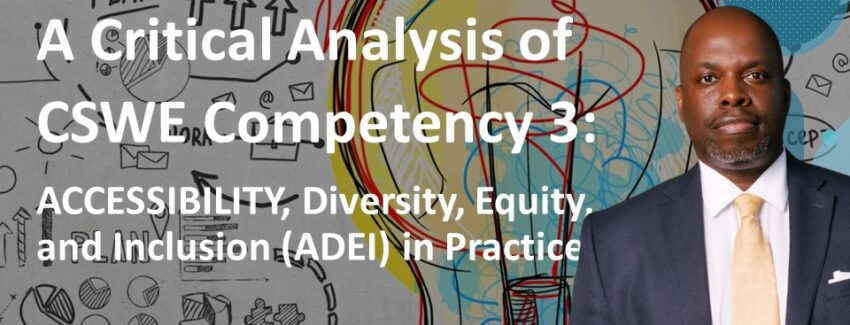Engage Access, Diversity, Equity, and Inclusion (ADEI) in Practice
Prologue: Radical Innovation - Decidedly Economic, Operational, and Constructivist
The Council on Social Work Education (CSWE) Competency 3 emphasizes the importance of engaging in anti-racism, diversity, equity, and inclusion (ADEI) in social work practice. This critical analysis proposes a reorganization of the construct to IDEA (Inclusion, Diversity, Equity, and Access) and a shift from "Anti-Racism" to "Access" to encompass ability concerns and intersectional barriers that deny access to specific individuals based on historical and institutional obstacles. This perspective is grounded in economic, operational, and constructivist principles, advocating for quantifiable advancements and systematic changes.
Economic, Operational, and Constructivist Foundations
The CSWE policy acknowledges the pervasive impact of racism, oppression, and privilege on human experiences and social work practice. However, this analysis proposes that focusing on economic, operational, and constructivist principles can provide a more comprehensive approach to addressing these issues. By concentrating on quantifiable advancements and the predictability and controllability of institutions, social workers can develop targeted interventions and promote systemic change.
Furthermore, this perspective contends that concepts like racism, oppression, and privilege are collaboratively created and maintained through interactions between individuals. These constructs will continue to wield power as long as they remain useful in discourse. Therefore, alternative language and solutions should be advanced to facilitate change.
Engaging Access, Diversity, Equity, and Inclusion (ADEI) in Practice
The revised CSWE Competency 3, focusing on IDEA, emphasizes the importance of understanding how access, diversity, equity, and inclusion intersect with various dimensions of human experience. Social workers must recognize how historical and societal roots of social and racial injustices contribute to forms of oppression and discrimination. This intersectionality implies that an individual's life experiences may encompass oppression, poverty, marginalization, and alienation, as well as privilege and power.
To engage in effective ADEI practice, social workers should:
- Demonstrate access, diversity, equity, and inclusion in social work practice at the individual, family, group, organizational, community, research, and policy levels.
- Demonstrate cultural humility by applying critical reflection, self-awareness, and self-regulation to manage the influence of bias, power, privilege, and values in working with clients and constituencies, acknowledging them as experts of their own lived experiences.
Advancing Solutions and Language
To promote meaningful change, social workers must adopt alternative language and solutions that address the systemic issues underlying racism, oppression, and privilege. By focusing on access, diversity, equity, and inclusion, social workers can develop targeted interventions and dismantle barriers that perpetuate inequality.
Social workers can now advocate for policies that promote equal access to resources and opportunities, such as affordable housing, quality education, and healthcare. Additionally, they can work to dismantle institutional barriers that disproportionately affect marginalized populations, such as discriminatory lending practices, voter suppression, and mass incarceration. The innovation is to conceptualize the interventions as institutional change processes rather than individual or group advocacy alone. Think policy and procedure manual change in addition to picket lines.
Social workers are admonished through licensure requirements to engage in ongoing professional development to enhance their cultural competence, understanding of intersectionality, and application of ethical practice. This includes seeking out educational opportunities, engaging in self-reflection, and actively seeking feedback from clients, colleagues, and communities. The innovation here requires active participation as an influencer as a prerequisite for advancement. Even beyond publishing research, this is a requirement to create implementation strategies and evidence in action.
In conclusion, this critical analysis of CSWE Competency 3 advocates for a shift in focus from anti-racism to access and the adoption of economic, operational, and constructivist principles. By concentrating on quantifiable advancements and systemic change, social workers can more effectively address the complex issues of racism, oppression, and privilege. By embracing alternative language and solutions, social workers can contribute to the dismantling of systemic barriers and promote a more just and equitable society.


DEI, DEIB, or IDEA: The BA in Social Justice and Institutional Change - MAWMedia Group, LLC
[…] further, the IDEA construct takes DEIB a step further. Dr. Michael A. Wright suggests the 'A' can stand for Access, paving the way for a more socially just and action-oriented approach. It also is more […]